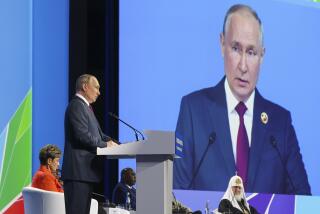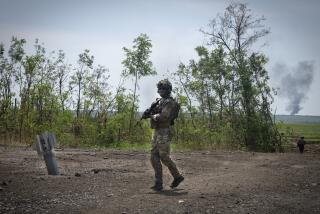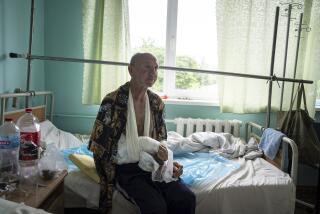Rebels Make Modest Gains in Battle for Kosovo
REZALA, Yugoslavia — Armed Albanian separatists killed a Serbian police officer and forced the closure of a busy highway Saturday, displaying a capacity for harassment despite a week of sharp setbacks in the battle for Kosovo province.
Neither incident signaled a counteroffensive by the Kosovo Liberation Army, which lost a logistics center and control of pivotal roads last week in a massive government assault. But the new action exposed the fragility of the government’s gains and the likelihood of conflict for weeks to come.
Serbian sources said a guerrilla sniper killed a police officer before dawn near Malisevo, the biggest town seized from the rebels.
Hours later, rebels east of the town skirmished with police along Kosovo’s main north-south highway, again closing one of three main arteries the army had unblocked a few days earlier.
A tour of four villages still in separatist hands Saturday offered the impression of an insurgency that is largely intact and regrouping for new battles. Rebels in the area, 25 miles west of the provincial capital, Pristina, strolled dusty streets in camouflage uniforms and black berets, mingling with villagers two days after the heaviest fighting.
“We are a young fighting force that has yet to fulfill its potential,” said the area’s bearded, 25-year-old guerrilla commander who rolled up in a black Mercedes-Benz with no license plates to a checkpoint made of sandbags and tree trunks at the entrance to this village.
Rising from obscurity last spring to embrace thousands of fighters roaming freely over about a third of the province, the rebel army has “passed from a time of euphoria to a process of settling down” from its recent losses, the commander added.
“From the position we’re in now, we’re looking at years of fighting, possibly at very high cost,” he said. “But this is our land. We have nowhere else to go.”
*
Such bravado is troublesome to U.S. and other Western officials who are trying restart peace talks in the hope that weakened rebels would soften their demand for independence from Serbia, the dominant republic of Yugoslavia.
The goal of independence is supported by nearly all Kosovo’s ethnic Albanians, who make up 90% of the province’s 2 million people. There are signs that civilian separatist leaders would be willing to settle for some form of autonomy short of statehood, but they are stiffly opposed by rebel spokesmen.
“The rebel commanders don’t consider this [offensive] a defeat,” said Mehmet Hajrizi, a civilian leader in daily contact with them. “We can see in their faces; they are absolutely sure of themselves.”
Past the checkpoint here Saturday came five tractor-driven wagons full of civilians straggling away from villages shelled last week by Serbian police and the Yugoslav army. The civilians joined hundreds of other newly uprooted Albanians being sheltered on classroom floors in the village school.
Despite government assurances that the offensive ended Thursday, shelling continued Saturday in a cluster of villages around Klina, a few miles north of here, residents fleeing the area said.
Tearful tales of burned-out homes and families split apart in flight made clear that Albanian civilians--an estimated 50,000 fled scores of villages--suffered far more from the assault than did the guerrillas, who claim to have lost no more than 10 fighters.
Describing one of the biggest battles, two fighters here said a 300-member rebel force withstood 48 hours of shelling and rocketing from three sides before abandoning a key highway barricade at Lapusnik--a position they had held for 11 weeks--and escaping through hidden tunnels. Two rebels were killed and five wounded in the battle, they said.
Some Albanians have faulted the rebels’ tactics, and they say they no longer believe that victory can be attained without military intervention by the United States or the North Atlantic Treaty Organization.
The rebel army “provoked a major conflict but was unable to protect the citizens or carry out an orderly evacuation” from government-shelled areas, said Albanian human rights activist Shkelzen Maliqi in Pristina.
Sensitive to such criticism, rebel leaders say they face a dilemma: They feel morally obliged to hold and organize their shrinking territory to protect civilian followers. Yet such a defensive mission detracts from their ability to do what guerrilla armies do best--keep moving and wage hit-and-run attacks.
“Our priority should be to go out and attack the Serbs, but it’s better to stay put,” said a 29-year-old farmer and rebel in the neighboring village of Marina who joined the rebel army six months ago. “If we withdraw from the villages, the Serbs will massacre every last one of these civilians.”
Fearing a drawn-out conflict that could spill into neighboring Balkan countries, special U.S. envoy Christopher Hill is trying to coax the separatists to resume peace talks with Yugoslav President Slobodan Milosevic.
Hill is working to unite the separatist leadership on a negotiating team that would, for the first time, include guerrilla representatives.
The rebels say they are unwilling to submit to civilian authority, as U.S. and other Western officials expect.
Demanding veto power over decisions of the new leadership, a rebel spokesman, Jakup Krasniqi, said last week: “Law and policy in Kosovo are made by the UCK”--the Albanian acronym for the rebel army.
Krasniqi’s authority to speak for the fractious rebel movement is suspect, but his view on military supremacy was echoed by rebels here.
“UCK is not just an army; it’s the voice of the people,” declared the area’s bearded commander, climbing back into his Mercedes and speeding away in a cloud of dust.
More to Read
Sign up for Essential California
The most important California stories and recommendations in your inbox every morning.
You may occasionally receive promotional content from the Los Angeles Times.










